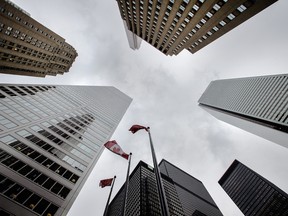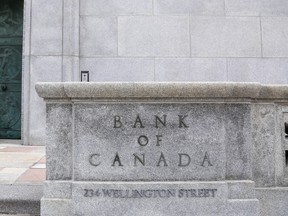Kevin Carmichael: A joint effort by the public and private sectors could mitigate the gloomy future foretold by the Bank of Canada’s models
Article content
We’re only two weeks in, but it feels like 2022 could be the year Canada’s business and political leaders finally get serious about climate change.
Advertisement
This advertisement has not loaded yet, but your article continues below.
Article content
Getting serious this late in the game isn’t something to applaud, necessarily, but as the saying goes: The best time to plant a tree was 20 years ago. The second best time is now.
One reason to think the dithering over climate change is about to stop is that the federal banking regulator has put the institutions it oversees on notice to prove they can be trusted to adequately adjust for the financial risks posed by climate change. If they don’t, the Office of the Superintendent of Financial Institutions will do it for them by requiring them to keep more capital in their rainy day funds.
“The focus … is around building risk-management infrastructure,” Ben Gully, assistant superintendent at OSFI, told reporters at a virtual press conference on Jan. 14. “We view that as appropriate and important because capital is no substitute for risk management, and we need to have risk management in place.”
Advertisement
This advertisement has not loaded yet, but your article continues below.
Article content
He added: “Near term, it’s risk management. Longer term, once that matures, we’ll move into the capital arena.”
In other words, if the biggest financial institutions can convince OSFI they’re applying the same strict standards to climate risk that they apply to small-business loans, they’ll probably be able to avoid onerous capital requirements. The banks are being offered a window to confront climate change on their own terms rather than those dictated by Ottawa. There’s every reason to think they will take it.
Make no mistake: the cost of capital for the biggest polluters will be going up no matter what, and the economic impact will be material because those polluters are the primary engines of Canada’s economy.
Advertisement
This advertisement has not loaded yet, but your article continues below.
Article content
OSFI’s guidance for where regulatory policy is headed was informed by joint research with the Bank of Canada showing there is nowhere to hide from the effects of climate change. A model-based analysis of four possible scenarios of how things could unfold over the next 30 years — status quo; a sluggish response that doesn’t meet current climate goals until 2100; a delayed response that requires catch-up to reach current goals by 2100; and a more vigorous embrace of net zero by 2050 — all concluded that industries such as oil and gas will have a harder time making money, and economic growth in Canada will suffer as a result.
“These are ‘what-if’ scenarios,” Toni Gravelle, a deputy governor at the Bank of Canada, said at the press conference. “The more sharp the policy that would have to be put in place (to meet emission targets), the stronger the catch-up policy to have to put in place, the more the transition risk increases.”
Advertisement
This advertisement has not loaded yet, but your article continues below.
Article content
-

Omicron hit likely short-lived but supply chains may suffer, says Bank of Canada governor
-

Jobs recovery bolsters case for Bank of Canada to hike soon
-

Macklem in year-end interview promises to rein in inflation, but not choke the recovery
The scenario analysis heralds the role the Bank of Canada and OSFI will play in the climate fight going forward. The central bank has little regulatory power, but it is by far the country’s most influential economic research institution, and its work holds the promise of becoming a neutral benchmark for environmental policy. OSFI, on the other hand, lacks the central bank’s ability to generate headlines, but it exerts considerable influence on Bay Street as the overseer of Canada’s banking oligopoly.
Advertisement
This advertisement has not loaded yet, but your article continues below.
Article content
The duo has the potential to become the centre of gravity in the climate debate, since the most important discussions will inevitably begin from benchmarks set by Bank of Canada governor Tiff Macklem and/or Peter Routledge, the head of OSFI.
Whether their respective work on climate change makes a difference will be up to the rest of us. The politics remain messy. For example, the oil industry’s political champions are often more stridently opposed to change than the industry itself. But the cartoon versions of the country’s political leaders that appear on Twitter each day are more aligned in real life. All the major parties endorsed some version of a carbon tax in the last election, and both the Liberals and Conservatives said Canada needs an agency with the wherewithal to finance theoretical research on the world’s biggest problems.
Advertisement
This advertisement has not loaded yet, but your article continues below.
Article content
Climate change would be an obvious target for such an agency, according to an essay by Robert Asselin and Sean Speer , policy experts who served Liberal and Conservative governments, respectively, published in the Financial Post on Jan. 10. Both are influential with business leaders and politicians: Asselin, who has worked for former finance minister Bill Morneau and BlackBerry Ltd., is now head of policy at the Business Council of Canada, an association of leading chief executives; and Speer is the Scotiabank fellow in strategic competitiveness at the Public Policy Forum, a think-tank with a board of directors populated by executives and high-ranking public servants.
A joint effort by the public and private sectors could mitigate the gloomy future foretold by the Bank of Canada’s models. The central bank based its analysis on current technology because it’s hard to model human ingenuity. A technological breakthrough or two would reverse the trend. Forces are coming together that could allow that to happen.
• Email: kcarmichael@postmedia.com | Twitter: carmichaelkevin
Advertisement
This advertisement has not loaded yet, but your article continues below.
Banks being put on notice regarding climate change policies signals change is in the air
2022-01-14 22:39:31





